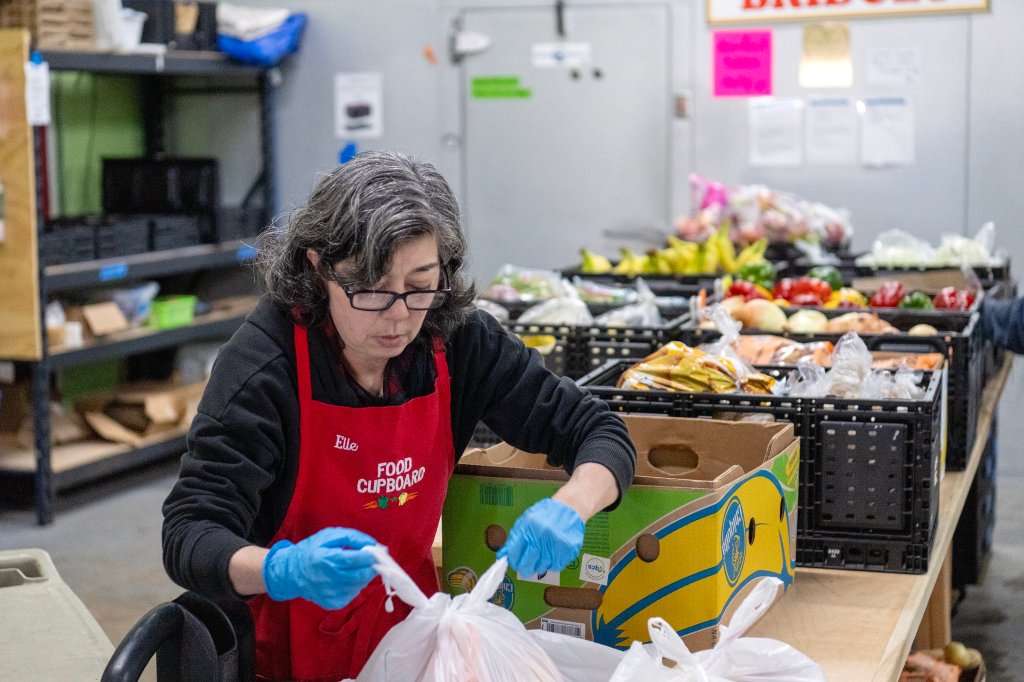
Food pantries across Maine have been serving an increasing number of people as grocery prices rise, and officials are bracing for more as thousands of residents start to see reductions in monthly food assistance benefits.
This rise in demand comes as food banks and pantries in Maine are grappling with federal cuts to the Emergency Food Assistance Program, which provides food distributed across the state. At the same time, expenses are increasing for local food pantries, often run by volunteers working with razor-thin budgets.
As Mainers begin to see reductions in their monthly Supplemental Nutritional Assistance Program benefit or lose it altogether, the emergency food network will face even more pressure to try to fill the gap.
Heather Paquette, president of Good Shepherd Food Bank, which has more than 600 partner agencies across the state, said those pantries will need more community support to keep up.
“We’re all experiencing higher fuel, transportation and food costs,” she said. “There’s a number of factors that are coming together to create more challenges in the emergency food space.”
For many pantries, their biggest need is more money to help Maine access healthy food.
Financial donations allow pantries to buy food in bulk at a lower cost. The money also helps the organizations pay for utilities, fuel and other expenses.
Before organizing a food drive or dropping off food donations, it’s a good idea to check with your local pantry to see what it needs. Some pantries have guidelines about items they will accept. And they have have specific items that are in high demand or that are needed to provide food to people with specific dietary needs or religious or cultural considerations.
If donating food, always check items to make sure they are not damaged, dented or in compromised packaging. Do not donate expired food.
When choosing which items to donate, it’s helpful to focus on nonperishable and nutritious food, like canned vegetables and fruit, whole grain rice and pasta, canned lean proteins like tuna and beans, and low-sodium soups.
If you have a vegetable garden at home or a plot in a community garden, check with your local food pantry to see if it will accept fresh produce during the growing season. Some pantries also accept fresh eggs from people who keep chickens.
Pantries may need nonfood items, such as basic toiletries or cleaning supplies and pet food. But check first, because some organizations don’t have the space to store such items.
Food pantries are often looking for volunteers to help with a variety of work, from organizing food to helping with distributions. They may also need help picking up donations from stores, cleaning, organizing fundraisers or handling administrative tasks. Sometimes, local farms that plant extra rows of produce for food pantries need people to help harvest those crops.
To find a food assistance program near you, check this list maintained by the Maine Department of Agriculture, Conservation and Forestry.
Good Shepherd Food Bank also has an interactive map that allows users to search for food pantries across the state.

We invite you to add your comments. We encourage a thoughtful exchange of ideas and information on this website. By joining the conversation, you are agreeing to our commenting policy and terms of use. More information is found on our FAQs. You can modify your screen name here.
Comments are managed by our staff during regular business hours Monday through Friday as well as limited hours on Saturday and Sunday. Comments held for moderation outside of those hours may take longer to approve.
Join the Conversation
Please sign into your CentralMaine.com account to participate in conversations below. If you do not have an account, you can register or subscribe. Questions? Please see our FAQs.